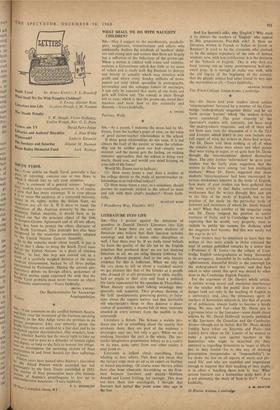SIR, — Dr. Davie told your readers about certain 'misconceptions' betrayed by
a number of the Cam- bridge 'undergraduate magazine Delta' and he set forth certain 'truisms' which 'the student writers never considered.' The great majority of the Spectator's readers will, naturally, not have read 'the undergraduate magazine,' and all of them will not have seen even the discussion of it in the TLS and Listener, which didn't in any case include any full report of what the writers in Delta had written. Yet Dr. Davie told them nothing at all of what the articles in Delta were about and what points they were trying to argue, or of quite how Dr. Davie thought the 'misconceptions' showed themselves there. The only further 'information' he gave your readers was the fairly plain suggestion that the writers in Delta were among 'our less intelligent students.' When Dr. Davie suggested that these students' misconceptions' had been encouraged by certain weaknesses inherent in the study of English, how many of your readers can have gathered that the main article in that Delta concerned serious weaknesses that the writers thought they saw not in the idea of the study of English, but in the practice of the study by the particular body of lecturers and examiners of whom Dr. Davie himself is one? When that number of the magazine came out, Dr. Davie resigned his position as senior treasurer of Delta, and in Cambridge we were half expecting that he would, very properly, want to explain in public his reasons for disliking what the magazine had become. But this was surely not the way to do it?
Your readers may be interested to learn that the writers of that main article in Delta criticised the tone of certain published remarks by a senior don —Professor C. S. Lewis—on the subject of Cam- bridge English undergraduates as being 'distasteful in its arrogance, distasteful in its authoritarian self- righteousness, distasteful finally in the contempt for the undergraduate that it suggests,' and that they asked to what extent this spirit was shared by other dons in the Cambridge English Faculty.
For the argument of Dr. Davie's whole article. A certain wrong moral and emotional interference by the teacher with his pupils' lives is always a danger (and not only in the teaching of English in a university); and, also, the missionary spirit of teachers of humanities subjects is, like that of priests or of politicians, always liable to become a heady thing. We may well feel—what Dr. Davie put in a previous letter to the Spectator—some doubt about articics by Mr. David Holbrook recently published in the Spectator, the Guardian and the Cambridge Review (though not in Delta). But Dr. Davie should frankly have taken on Socrates and Plato—and frankly have taken on Dr. Lcavis—if he wanted to make a general case against teachers in the humanities who might be described (by their enemies) as regarding themselves as 'sages at liberty (no, in duty bound—for to this way of thinking presumption masquerades as "responsibility") to lay down the law on all aspects of social and per- sonal life' and who are muddled and impertinent enough to suppose that their teaching of their pupils , is in effect a 'teaching them how to live.' What serious function can a humanities study have if it is not ultimately the study of 'how to live'?—Yours faithfully,


































 Previous page
Previous page